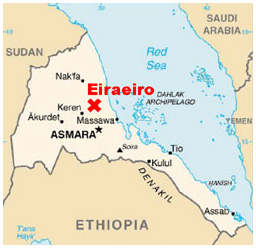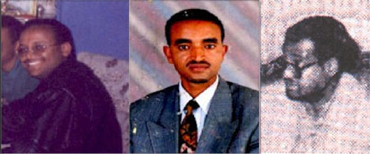Reporters Without Borders today called
on the Eritrean government to urgently produce evidence that three
journalists illegally held since September 2001 are still alive, as
information from credible sources indicates they died in the course
of the past 20 months in a detention centre at a place called
Eiraeiro, in a remote northeastern desert.
The organisation wrote to the Eritrean
embassy in France on 9 October asking the government to provide an
explanation “within a reasonable period” about these “very
disturbing reports.” If we do not get a reply from you in the near
future, our organisation will publish this information,” said the
letter, which did not receive a response.
“This silence on the part of the
Eritrean authorities is inhumane and intolerable,” Reporters Without
Borders said today. “Dozens of political prisoners have disappeared
into jails run by the armed forces. They include at least 13
journalists, of whom there has been no word for nearly five
years.”
The organisation added: “We now have
extremely disturbing revelations in the report on the Eiraeiro
detention centre. No foreign government should continue to have any
dealings with President Issaias Afeworki and his government without
insisting on serious, documented explanations.”
The report on Eiraeiro, located in the
Sheib subzone of the Northern Red Sea administrative region, was
posted on the Internet in August. It contains precise and verifiable
information about the exact location of the detention centre, where
at least 62 political prisoners were said to be held, including
former ministers, another senior officials, high-ranking military
officers, government opponents and eight of the 13 journalists held
since a round-up in September 2001.
 Initially published in the Tigrinya language on 17
August on aigaforum.com, an Ethiopian website, it was translated
into English and posted on 31 August on awate.com, an Eritrean
opposition site that is edited in the United States. Reporters
Without Borders knows the sources for the information in the report,
although it will not identify them for security reasons, and
believes them to be credible and serious.
Initially published in the Tigrinya language on 17
August on aigaforum.com, an Ethiopian website, it was translated
into English and posted on 31 August on awate.com, an Eritrean
opposition site that is edited in the United States. Reporters
Without Borders knows the sources for the information in the report,
although it will not identify them for security reasons, and
believes them to be credible and serious.
The Eiraeiro detention centre is said to
have been built in this northeastern desert in 2003. An Eritrean
journalist in exile told Reporters Without Borders that it is “one
of the country’s hottest areas.” To get to Eiraeiro, you reportedly
have to walk for two hours from the nearest road, linking Serjeka
and Gahtelay, northwest of Filfil Selomuna. Consisting of 62 cells
measuring 3 metres by 3 metres, it is said to contain detainees who
were previously held in Embatkala, in the east of the country.
The prisoners named in the report
include Seyoum Tsehaye (or Fsehaye), a freelance journalist (cell
No. 10), Dawit Habtemichael, deputy editor and co-founder of Meqaleh
(cell No. 12), a journalist identified by the first name “Yosief” or
“Yusuf,” who is almost certainly Yusuf Mohamed Ali, the editor of
Tsigenay (cell No. 9), Medhane Tewelde (almost certainly Medhane
Haile), deputy editor and co-founder of Keste Debena (cell No. 8),
Temesghen Gebreyesus, journalist and member of the Keste Debena
board (cell No. 23), Said Abdulkader, editor and founder of Admas
(cell No. 24), and Emanuel Asrat, editor of Zemen (cell No. 25).
An Eritrean former political prisoner
now in exile told Reporters Without Borders on condition on
anonymity that Fessahaye “Joshua” Yohannes, a playwright and
journalist with the newspaper Setit, is now also being held at
Eiraeiro, in cell No. 18. He was previously held in Dongolo prison
in the south of the country, in an underground cell measuring just
1.5 metres by 1.5 metres, and 2.5 metres tall, lit by a bulb that
was never turned off.
One of his friends, who said he was held
at the same time as Yohannes and who now lives in exile, told
Reporters Without Borders that Yohannes was subjected to various
forms of torture including having his finger-nails ripped out.
They are all part of a group of 13
journalists who were rounded up by the police during the week of 18
to 25 September 2001 after the government decided to “suspend” all
of Eritrea’s privately-owned media and ordered the arrest of
everyone considered to a member of the opposition.
The report says at least nine of the
detainees at Eiraeiro have died as a result of “various illnesses,
psychological pressure or suicide.” They include three of the
journalists named above - Yusuf Mohamed Ali, who reportedly died on
13 June, Medhane Haile, who reportedly died in February, and Said
Abdulkader, who reportedly died in March 2005.
All of the Eritreans consulted by
Reporters Without Borders said the information contained in the
report was “entirely plausible,” at the very least, even if it could
not currently be verified. An Eritrean journalist now in exile said
that when he was held at a detention centre like Eiraeiro in 2000:
“Many prisoners held at the same time as me died as a result of
malaria attacks or other illnesses. Their bodies were thrown in
unmarked common graves. In some cases, the authorities led their
families to believe they had escaped or were killed by
Ethiopians.”
The report contains harrowing
descriptions of conditions at Eiraeiro. Most of the detainees are
chained by their hands. They sleep on the ground and have no bed
linen. Their heads and beards are shaved once a month. Since
February, they have been let out of their cells for an hour a day
but without being allowed contact with other prisoners. Any attempt
to converse with the camp’s guards is immediately punished.
Since 2001, Reporters Without Borders
and other human rights and press freedom groups have been calling
for the release of Eritrea’s political prisoners, including the 13
journalists arrested in the round-up of September of that year. The
Eritrean government claims they are being held as part of a
parliamentary investigation into “spying” and “treason.”
The “suspension” of the privately-owned
media came as the second war with Ethiopia was ending in 2001, when
the independent press relayed calls for democratisation by 15 senior
ruling party members known as the “Group of 15” or “G-15” and the
government reacted on 18 September 2001 by cracking down on the G-15
and the opposition. After 10 of the detained journalists staged a
hunger strike, they were transferred in April 2002 to detention
centres in undisclosed locations.

From left to right : Said
Abdulkader, Medhane Haile and Yusuf Mohamed
Ali
